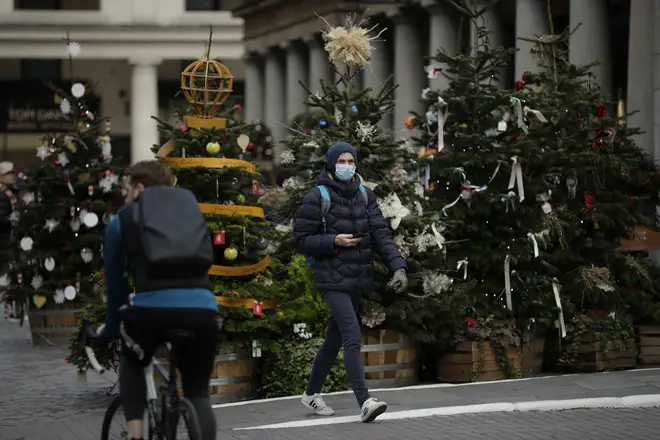
Paul Brand 3pm - 6pm
27 November 2020, 15:39 | Updated: 27 November 2020, 22:09

Any relaxation of restrictions over the festive period will result in a "large" rise in coronavirus transmission rates and prevalence "could easily double", scientists advising the Government have said.
In a set of documents released on Friday, the Scientific Advisory Group for Emergencies (Sage), which advises the Government, said "substantial mixing" of people over a short period of time represents a "significant risk for wide-spread transmission".
In a meeting on November 18 - a few days before the Government announced that there would be a limited relaxation of restrictions at Christmas - the scientists warned: "The prevalence could easily double during a few days of festive season, with further multiplicative increases as new infections go back to their 'routine' networks."
Read more: PM defends Covid tier system as he faces backbench revolt
Read more: UK coronavirus R rate drops to between 0.9 and 1
This week Boris Johnson told families they must make a "personal judgment" about the risks of coronavirus to vulnerable loved ones when forming a Christmas bubble.
The Prime Minister urged the public to "think carefully" over the festive period after it was confirmed that three households will be able to mix from December 23 to 27.

Nick Ferrari confronts Jenrick on PM's "lie" about Christmas
Earlier on Friday, SAGE member Professor John Edmunds warned there is limited scope for easing coronavirus restrictions in England before Christmas.
He said they will have had little chance to assess how well the new tiered controls were working when they come up for the first 14-day review in mid-December.
Prof Edmunds said: "I think that is quite an early time to be able to see what the effect has been. I think we will still be seeing the effect of the lockdown at that point in time.
"For me I think that is quite an early review stage. I can't imagine there will be huge changes at that point just simply because I don't think we will have accumulated much data by then."
The report came after Boris Johnson defended the new coronavirus tier system, saying it was the only option for Government to avoid "loads and loads of complicated sub-divisions".
The Prime Minister said they were essential to get coronavirus down but acknowledged why people might be "frustrated" by the rules, particularly if they were in an area with low infection rates.

Older caller plans to break Christmas Covid rules
"I know it is frustrating for people when they are in a high-tier area when there is very little incidence in their village or their area. I totally understand why people feel frustrated," he said during a visit to a public health laboratory in Wiltshire.
"The difficulty is that if you did it any other way, first of all you'd divide the country up into loads and loads of very complicated sub-divisions - there has got to be some simplicity and clarity in the way we do this.
"The second problem is that, alas, our experience is that when a high-incidence area is quite close to a low-incidence area, unless you beat the problem in the high-incidence area, the low-incidence area I'm afraid starts to catch up."
The Government is facing anger from Tory MPs and the hospitality sector over the decision to place 99 percent of England into the toughest two tiers of Covid restrictions.
More than 55 million people will be placed into Tier 2 and 3 from Wednesday, meaning mixing between households indoors will effectively be banned for the vast majority of the country.
MPs want to see more evidence from the government on the decision-making process behind the new Tiers.